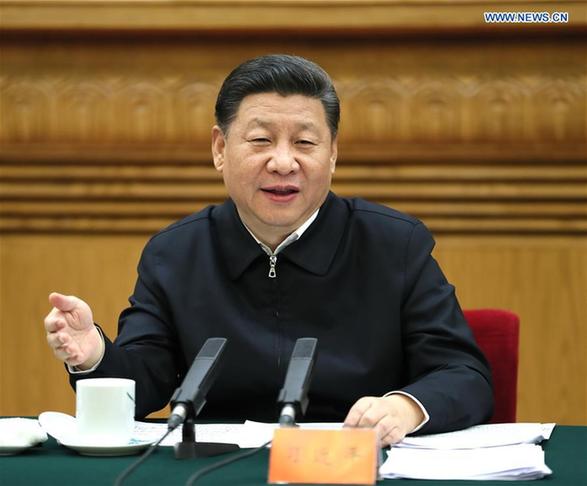President Xi Jinping on Friday called for an overall national security outlook at a seminar in Beijing, emphasizing the importance of political, economic, territorial, social and cyber security.
|

|
|
Chinese President Xi Jinping, who heads the National Security Commission (NSC), presides over a seminar on national security in Beijing, capital of China, Feb. 17, 2017. (Xinhua/Lan Hongguang)
|
Xi, who heads the National Security Commission (NSC), presided over the seminar on national security on Friday. Premier Li Keqiang and top legislator Zhang Dejiang, the two deputy heads of the NSC, were present at the seminar.
After listening to reports by Public Security Minister Guo Shengkun, Vice Foreign Minister Zhang Yesui, Hubei Province Party chief Jiang Chaoliang, and Xinjiang Uygur Autonomous Region Party Chief Chen Quanguo, Xi said national security has become more and more important in the work of the Party and the state, adding that national security work is all about the people’s interests.
Xi, also general secretary of the Communist Party of China (CPC) Central Committee and chairman of the Central Military Commission, stressed that safeguarding national security requires the grasp of rules in the context of the great changes in the international order, and that the planning work must give priority to the prevention of risks.
National security planning must consider the general background that China is in a period of important strategic opportunity for development, Xi said.
“The overall direction of multipolarization of the world, the globalization of the economy and the democratization of international relations has not changed,” said Xi.
“No matter how the international situation changes, we must maintain our strategic steadiness, strategic confidence and strategic patience,” the president said.
He called for global vision in national security work, coordinating development and security, combining principles with tactics, and taking the strategic initiative in China’s own hand.
Xi called for enhancing a prevention and control system for public security, improving overall capability in social management, and solving problems and disputes at their roots.
Xi stressed efforts should be made to enhance security in fields including transport and production of hazardous chemicals and improve fire prevention and control so that major accidents do not occur.
A firm fence of cyber security should be consolidated, and efforts should be made to better safeguard cyber security and key information infrastructure, Xi said.
Xi said the development of core technologies should be facilitated and early warning and monitoring of cyber security should be strengthened, in addition to ensuring the security of big data.
Xi stressed the need to proactively shape China’s external security environment, adding the country must strengthen cooperation in security field and guide the international community to jointly safeguard international security.
Xi called for enhanced capacity building in terms of materials, technology, equipment, talent, law and mechanism to safeguard national security.
He underscored that it was a fundamental principle for national security work to adhere to the leadership of the Party, adding local Party leaderships must fulfill their national security obligations.
